情态动词
图片预览
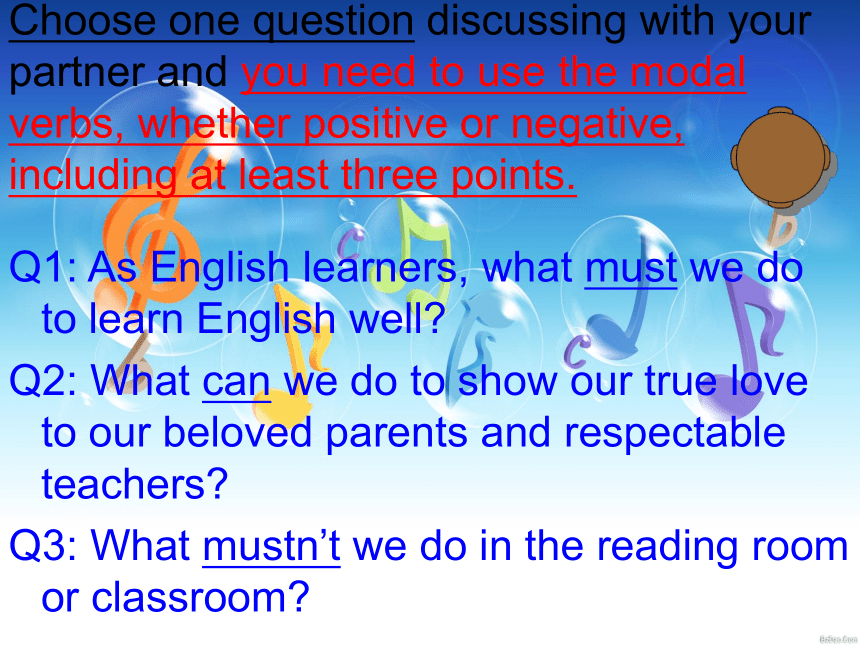
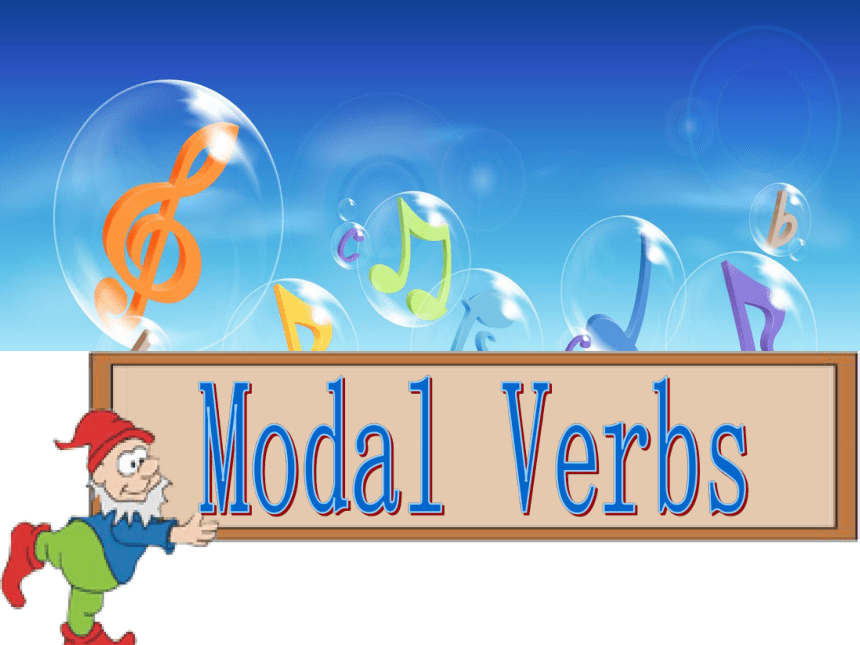
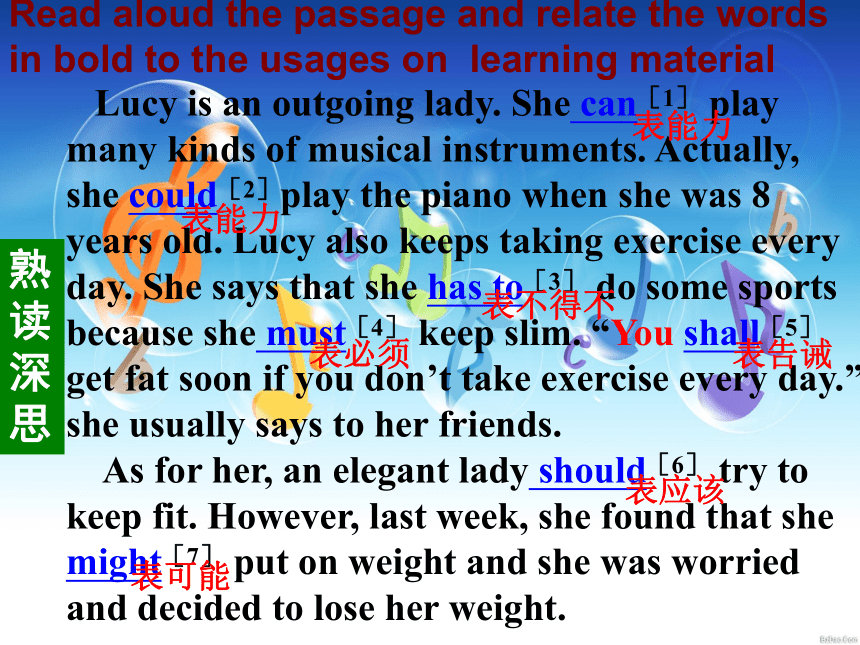
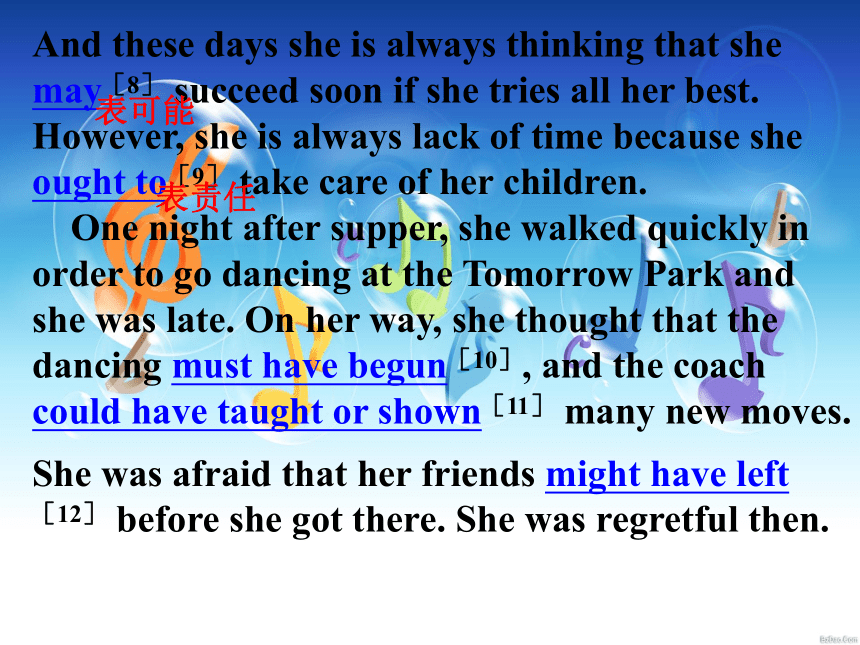
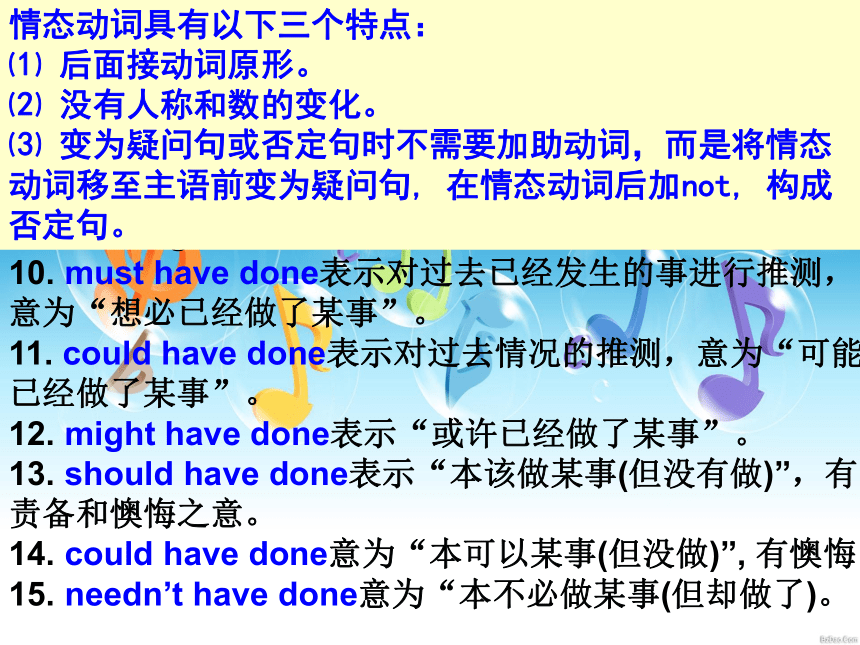

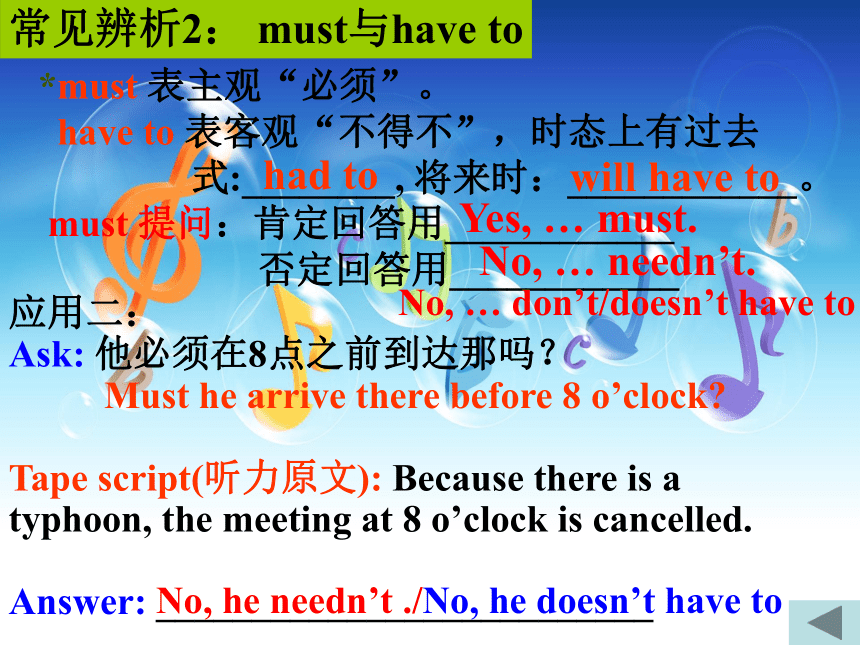
文档简介
课件16张PPT。Choose one question discussing with your partner and you need to use the modal verbs, whether positive or negative, including at least three points.Q1: As English learners, what must we do to learn English well?
Q2: What can we do to show our true love to our beloved parents and respectable teachers?
Q3: What mustn’t we do in the reading room or classroom?Modal Verbs熟读深思 Lucy is an outgoing lady. She can[1] play many kinds of musical instruments. Actually, she could[2]play the piano when she was 8 years old. Lucy also keeps taking exercise every day. She says that she has to[3] do some sports because she must[4] keep slim. “You shall[5] get fat soon if you don’t take exercise every day.” she usually says to her friends.
As for her, an elegant lady should[6] try to keep fit. However, last week, she found that she might[7] put on weight and she was worried and decided to lose her weight. 表能力表能力表不得不表必须表告诫表应该表可能Read aloud the passage and relate the words in bold to the usages on learning materialAnd these days she is always thinking that she may[8] succeed soon if she tries all her best. However, she is always lack of time because she ought to[9] take care of her children.
One night after supper, she walked quickly in order to go dancing at the Tomorrow Park and she was late. On her way, she thought that the dancing must have begun[10], and the coach could have taught or shown[11] many new moves. She was afraid that her friends might have left [12] before she got there. She was regretful then.表可能表责任She should have had[13] supper earlier, or she could have taken a taxi[14], and indeed she needn’t have taken[15] a bath in advance. When she reached the park finally, she found nobody was there. She remembered suddenly that it had been reported on the radio that there would be a heavy rain that night.
10. must have done表示对过去已经发生的事进行推测,意为“想必已经做了某事”。
11. could have done表示对过去情况的推测,意为“可能已经做了某事”。
12. might have done表示“或许已经做了某事”。
13. should have done表示“本该做某事(但没有做)”,有责备和懊悔之意。
14. could have done意为“本可以某事(但没做)”, 有懊悔
15. needn’t have done意为“本不必做某事(但却做了)。
情态动词具有以下三个特点:
⑴ 后面接动词原形。
⑵ 没有人称和数的变化。
⑶ 变为疑问句或否定句时不需要加助动词,而是将情态动词移至主语前变为疑问句, 在情态动词后加not, 构成否定句。
1.can/could表示一般现在时和一般过去时
两种时态,所有其他时态(包括将来时)
须用be able to+动词
2.表示成功地做了某事时,只能用be able to,
不能用can / could
He ______ speak English well.
Will you ____________finish the chemical
experiment today?
3.He _________ flee Europe before the war broke out. = He managed to flee ( succeeded in fleeing )
Europe before the war broke out.
be able to was able tocan 辨析1 表能力can / could / be able to *must 表主观“必须”。
have to 表客观“不得不”,时态上有过去 式:________, 将来时:____________。
must 提问:肯定回答用____________
否定回答用____________
常见辨析2: must与have tohad towill have to应用二:
Ask: 他必须在8点之前到达那吗?
Must he arrive there before 8 o’clock?
Tape script(听力原文): Because there is a typhoon, the meeting at 8 o’clock is cancelled.
Answer: __________________________No, he needn’t ./No, he doesn’t have to Yes, … must.No, … needn’t.No, … don’t/doesn’t have tocan---
may---
must---
should--用于否定和疑问的推测,肯定 “有时也会”用于肯定句和否定句只能用于肯定句1.______ the story be true?
2.Wang Feng wins an award every year,
she _____ be very strong.
3.There is no lights on. They ___ not be at home.
4.Peter ____ come with us , but he isn’t very sure yet.
5.If they start today, they ______ arrive there in two days.Canmustcanmay 点拨3 情态动词表猜测 should 情态动词表示推测,语气由强到弱的是:must (一定会)
→ought to / should ( 想必会 ) →can / could ( 可能,有时也会 ) →may / might ( 也许,或许 ) 。 理应,想必会 1.He ___________(do) his exercises in the classroom now because he hasn’t finished yet.
2.They _____________ in the library now for I saw them leave the library just now.
3.The boy ________________ (watch) TV at home now but I am not sure.
4.她上个星期一定读过这本小说了。
5.她不可能放学回家了,因她的自行车还在这里。________________________, for her bike is still here.
6.你可能在购物时弄丢了你的钱.
_____________________ while shopping. must be doingmay / might be watching can’t be readingShe must have read the novel last week.She can’t have left schoolYou may have lost your purse1. I didn’t hear the phone. I _____ (be) asleep.
2. ---There were already five people in the car, but they managed to take me as well.
----It ____(be) a comfortable journey.即时练习:couldn’t have beenmust have been见学案知识网络情态动词+have done 的特殊意义即时练习①The weather turned out to be fine yesterday. I ________(take) the trouble to carry my umbrella with me. needn’t have taken 1.__ better do/not do
2.______ rather do…than do….
3.____ not …too/enough
You can’t be too careful when you’re driving.
You can’t remember enough English words.
4.can’t help but do sth
I can’t help but admire your courage.hadwouldcan 情态动词常用惯用语 1.Listen to these words from Darwen P. Kingsley: “you have powers you never dreamed of. You can do things you never thought you ____ do. There are no limitations in what you can do except the limitations of you own mind.”(2010茂二)
2. Finally, international students who study in China, even short term, should _________(allow) to work when they graduate.
3. She must _______(feel) my presence because she would occasionally look in my direction.(2012茂二改编)could*句子完整,空格后谓语动词是原形,特别上下文
时态不一致,很可能填情态动词be allowed*情态动词+被动have felt*对过去肯定推测及本该等,参照过去的时态 情态动词与语法填空 情态动词与篇章运用 Passage 1: People do not analyze every problem they meet. Sometimes they try to remember a solution from the last time they had a similar problem. They often accept the opinions or ideas of other people. Other times they begin to act without thinking; they try to find a solution by trial and error. However, when all these methods fail, the person with a problem has to start analyzing. There are six stages in analyzing a problem. 44. Which of the following is NOT true? A. People do not analyze the problem they meet.
B. People often accept the opinions or ideas of other
C. People may learn from their past experience
D. People can not solve some problems they meet.选项中含有不十分肯定的语气词一般是正确答案项。这些语气词有: can, could, may, should, usually, might, most(大多数),more or less, relatively, be likely to, possible, whether or, not necessarily 等。 A Passage 3 marriage vows
I, [Groom's name], take you [Bride's name], to be my wife, my partner in life and my one true love.
I will cherish our friendship and love you today, tomorrow, and forever.
I will trust you and honor you.
I will laugh with you and cry with you.
I will love you faithfully.
Through the best and the worst,
Through the difficult and the easy.
What may come I will always be there.
As I have given you my hand to hold.
So I give you my life to keep.
So help me God. Will 表相爱的人同舟
共济,相濡以沫的美好
愿望What is the fun_ction of
the word “will” ?*小结:
1.情态动词具有三个特点
2.情态动词的含义,基本用法巩固及辨析
3.情态动词表推测的含义及它们语气强弱
4.情态动词常用惯用语
5.阅读理解中的语气辨别;
语法填空可能考点
*句子完整,空格后谓语动词是原形,特别上下文
时态不一致,很可能填情态动词;
*情态动词+被动;
*对过去肯定推测及本该等,参照过去的时态
HW:1.巩固情态动词的用法,特别语气和推断
2. 注意听说考试中的翻译问句
Q2: What can we do to show our true love to our beloved parents and respectable teachers?
Q3: What mustn’t we do in the reading room or classroom?Modal Verbs熟读深思 Lucy is an outgoing lady. She can[1] play many kinds of musical instruments. Actually, she could[2]play the piano when she was 8 years old. Lucy also keeps taking exercise every day. She says that she has to[3] do some sports because she must[4] keep slim. “You shall[5] get fat soon if you don’t take exercise every day.” she usually says to her friends.
As for her, an elegant lady should[6] try to keep fit. However, last week, she found that she might[7] put on weight and she was worried and decided to lose her weight. 表能力表能力表不得不表必须表告诫表应该表可能Read aloud the passage and relate the words in bold to the usages on learning materialAnd these days she is always thinking that she may[8] succeed soon if she tries all her best. However, she is always lack of time because she ought to[9] take care of her children.
One night after supper, she walked quickly in order to go dancing at the Tomorrow Park and she was late. On her way, she thought that the dancing must have begun[10], and the coach could have taught or shown[11] many new moves. She was afraid that her friends might have left [12] before she got there. She was regretful then.表可能表责任She should have had[13] supper earlier, or she could have taken a taxi[14], and indeed she needn’t have taken[15] a bath in advance. When she reached the park finally, she found nobody was there. She remembered suddenly that it had been reported on the radio that there would be a heavy rain that night.
10. must have done表示对过去已经发生的事进行推测,意为“想必已经做了某事”。
11. could have done表示对过去情况的推测,意为“可能已经做了某事”。
12. might have done表示“或许已经做了某事”。
13. should have done表示“本该做某事(但没有做)”,有责备和懊悔之意。
14. could have done意为“本可以某事(但没做)”, 有懊悔
15. needn’t have done意为“本不必做某事(但却做了)。
情态动词具有以下三个特点:
⑴ 后面接动词原形。
⑵ 没有人称和数的变化。
⑶ 变为疑问句或否定句时不需要加助动词,而是将情态动词移至主语前变为疑问句, 在情态动词后加not, 构成否定句。
1.can/could表示一般现在时和一般过去时
两种时态,所有其他时态(包括将来时)
须用be able to+动词
2.表示成功地做了某事时,只能用be able to,
不能用can / could
He ______ speak English well.
Will you ____________finish the chemical
experiment today?
3.He _________ flee Europe before the war broke out. = He managed to flee ( succeeded in fleeing )
Europe before the war broke out.
be able to was able tocan 辨析1 表能力can / could / be able to *must 表主观“必须”。
have to 表客观“不得不”,时态上有过去 式:________, 将来时:____________。
must 提问:肯定回答用____________
否定回答用____________
常见辨析2: must与have tohad towill have to应用二:
Ask: 他必须在8点之前到达那吗?
Must he arrive there before 8 o’clock?
Tape script(听力原文): Because there is a typhoon, the meeting at 8 o’clock is cancelled.
Answer: __________________________No, he needn’t ./No, he doesn’t have to Yes, … must.No, … needn’t.No, … don’t/doesn’t have tocan---
may---
must---
should--用于否定和疑问的推测,肯定 “有时也会”用于肯定句和否定句只能用于肯定句1.______ the story be true?
2.Wang Feng wins an award every year,
she _____ be very strong.
3.There is no lights on. They ___ not be at home.
4.Peter ____ come with us , but he isn’t very sure yet.
5.If they start today, they ______ arrive there in two days.Canmustcanmay 点拨3 情态动词表猜测 should 情态动词表示推测,语气由强到弱的是:must (一定会)
→ought to / should ( 想必会 ) →can / could ( 可能,有时也会 ) →may / might ( 也许,或许 ) 。 理应,想必会 1.He ___________(do) his exercises in the classroom now because he hasn’t finished yet.
2.They _____________ in the library now for I saw them leave the library just now.
3.The boy ________________ (watch) TV at home now but I am not sure.
4.她上个星期一定读过这本小说了。
5.她不可能放学回家了,因她的自行车还在这里。________________________, for her bike is still here.
6.你可能在购物时弄丢了你的钱.
_____________________ while shopping. must be doingmay / might be watching can’t be readingShe must have read the novel last week.She can’t have left schoolYou may have lost your purse1. I didn’t hear the phone. I _____ (be) asleep.
2. ---There were already five people in the car, but they managed to take me as well.
----It ____(be) a comfortable journey.即时练习:couldn’t have beenmust have been见学案知识网络情态动词+have done 的特殊意义即时练习①The weather turned out to be fine yesterday. I ________(take) the trouble to carry my umbrella with me. needn’t have taken 1.__ better do/not do
2.______ rather do…than do….
3.____ not …too/enough
You can’t be too careful when you’re driving.
You can’t remember enough English words.
4.can’t help but do sth
I can’t help but admire your courage.hadwouldcan 情态动词常用惯用语 1.Listen to these words from Darwen P. Kingsley: “you have powers you never dreamed of. You can do things you never thought you ____ do. There are no limitations in what you can do except the limitations of you own mind.”(2010茂二)
2. Finally, international students who study in China, even short term, should _________(allow) to work when they graduate.
3. She must _______(feel) my presence because she would occasionally look in my direction.(2012茂二改编)could*句子完整,空格后谓语动词是原形,特别上下文
时态不一致,很可能填情态动词be allowed*情态动词+被动have felt*对过去肯定推测及本该等,参照过去的时态 情态动词与语法填空 情态动词与篇章运用 Passage 1: People do not analyze every problem they meet. Sometimes they try to remember a solution from the last time they had a similar problem. They often accept the opinions or ideas of other people. Other times they begin to act without thinking; they try to find a solution by trial and error. However, when all these methods fail, the person with a problem has to start analyzing. There are six stages in analyzing a problem. 44. Which of the following is NOT true? A. People do not analyze the problem they meet.
B. People often accept the opinions or ideas of other
C. People may learn from their past experience
D. People can not solve some problems they meet.选项中含有不十分肯定的语气词一般是正确答案项。这些语气词有: can, could, may, should, usually, might, most(大多数),more or less, relatively, be likely to, possible, whether or, not necessarily 等。 A Passage 3 marriage vows
I, [Groom's name], take you [Bride's name], to be my wife, my partner in life and my one true love.
I will cherish our friendship and love you today, tomorrow, and forever.
I will trust you and honor you.
I will laugh with you and cry with you.
I will love you faithfully.
Through the best and the worst,
Through the difficult and the easy.
What may come I will always be there.
As I have given you my hand to hold.
So I give you my life to keep.
So help me God. Will 表相爱的人同舟
共济,相濡以沫的美好
愿望What is the fun_ction of
the word “will” ?*小结:
1.情态动词具有三个特点
2.情态动词的含义,基本用法巩固及辨析
3.情态动词表推测的含义及它们语气强弱
4.情态动词常用惯用语
5.阅读理解中的语气辨别;
语法填空可能考点
*句子完整,空格后谓语动词是原形,特别上下文
时态不一致,很可能填情态动词;
*情态动词+被动;
*对过去肯定推测及本该等,参照过去的时态
HW:1.巩固情态动词的用法,特别语气和推断
2. 注意听说考试中的翻译问句
